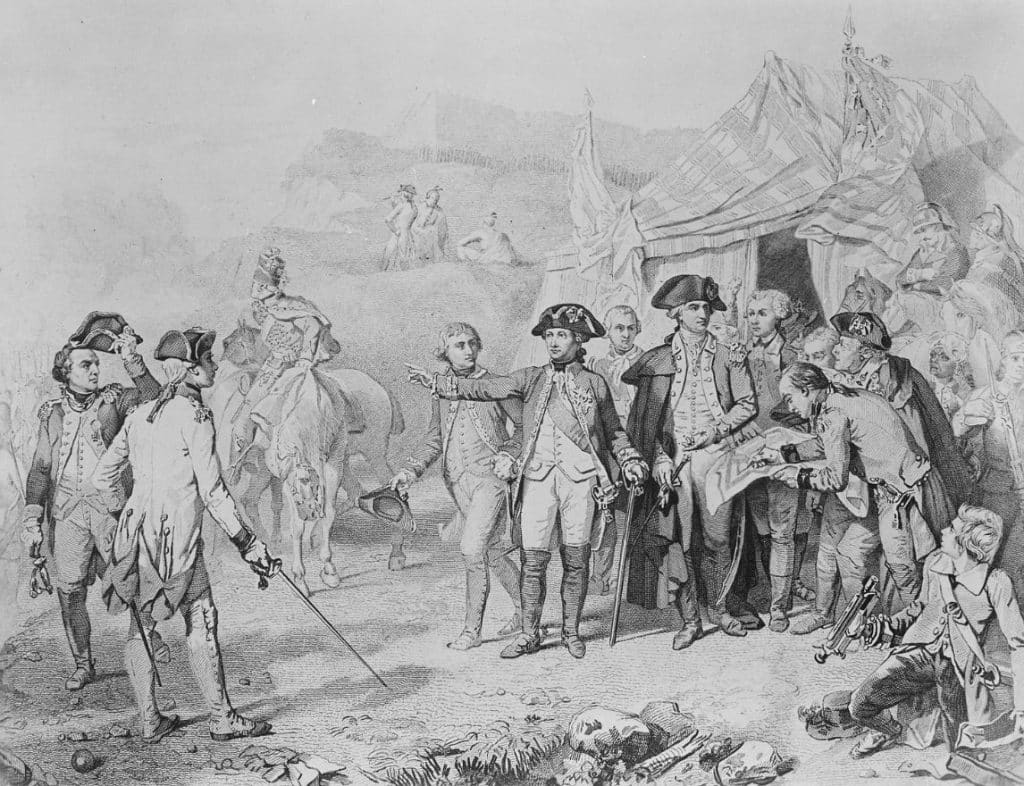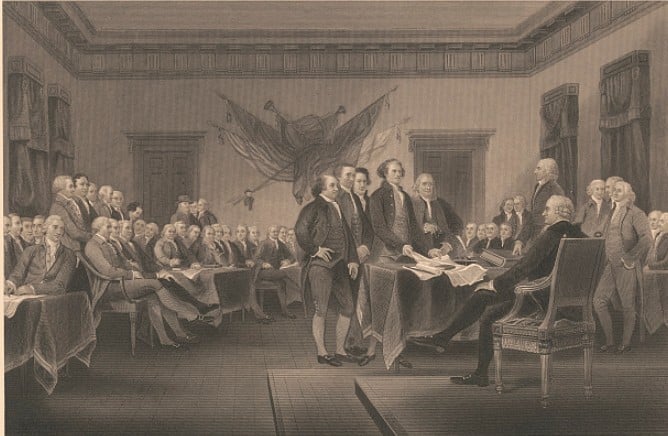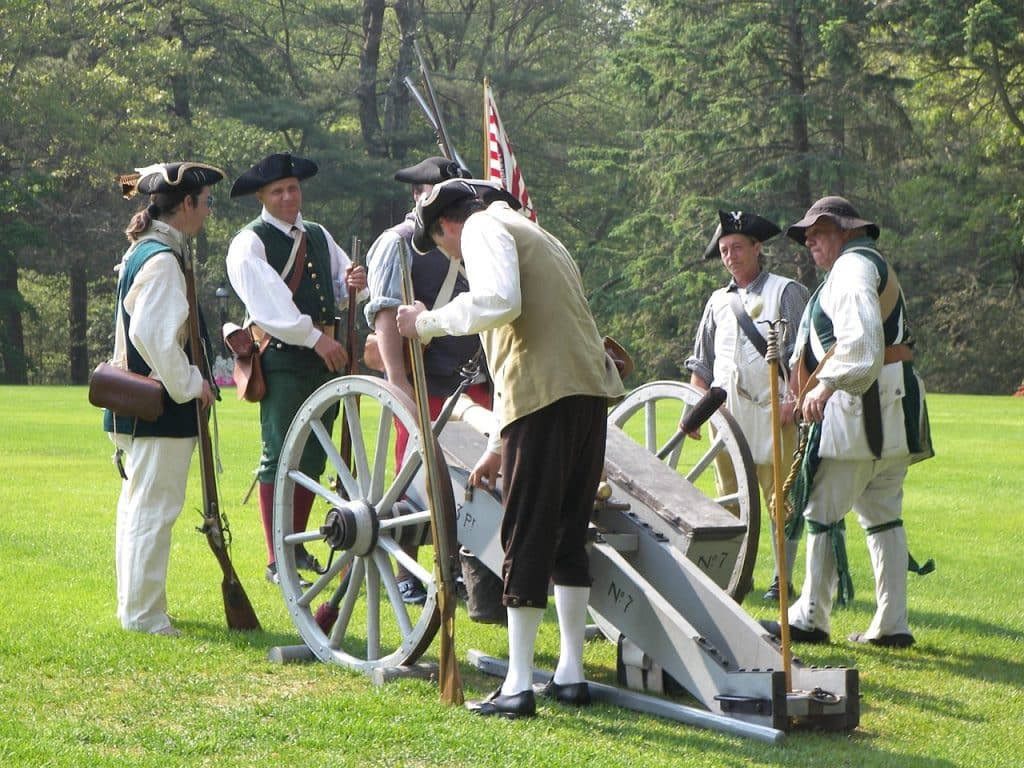Researching Your Colonial Ancestors, Part I [249 Years of American Independence]
 5
5Jul

Our ancestors celebrated Independence Day much as we do today. The flashing explosions of fireworks have captivated the eyes and hearts of colonial America since the adoption of the Declaration of Independence on July 4, 1776.
Many Americans today can trace their lineage back to the colonial era and find that their ancestors were from both the northern and southern colonies. Part I of this blog series will focus on researching your colonial ancestors from the southern colonies: Maryland, Virginia, North Carolina, South Carolina, and Georgia. Part II will focus on the northern colonies: Delaware, Pennsylvania, New Jersey, New York, Connecticut, Rhode Island, New Hampshire, and Massachusetts. Although all part of the original 13 colonies, research in the southern colonies comes with its own challenges and research strategies.
Burned Counties
One of the first things a genealogist needs to know before beginning research on their colonial ancestor is that just because a record should exist, doesn’t mean it does. Many courthouses were severely damaged or completely destroyed because of natural disasters such as fires or floods, and many courthouses were intentionally destroyed during periods of war. During the Civil War, 45 courthouses in the south were burned.[1] Oftentimes, colonial-era records were destroyed or badly damaged. In some cases, records were able to be saved and moved to a secure location.
Before doing research in any county, it is wise to check the FamilySearch Wiki. There will be a section for record loss, if any. For example, the wiki page for Albemarle County, Virginia, notes record loss in 1781 that destroyed all of the courthouse order books (except the first) and many loose papers from 1748 to 1791. All of Virginia lost the 1790 and 1800 census, so if you can’t find an ancestor in one of those censuses, it is because they do not exist.
Luckily, there are workarounds for burned or missing records. Utilize records such as church, tax, probate, newspapers, and other published records to piece together your ancestor’s life when records are not available.
Maryland
The charter for the Colony of Maryland was granted to Cecilius Calvert, 2nd Baron Baltimore, son of George Calvert, 1st Baron Baltimore, in 1632. Maryland before and during the colonial times was a predominately Catholic colony. In 1750, two surveyors named Charles Mason and Jeremiah Dixon established a boundary separating Maryland and Pennsylvania. This line became known as the Mason-Dixon Line and was later used to distinguish between free states (north of the boundary) and slave states (south of the boundary).
Tax and court records are a rich resource for Maryland research. The provincial court (pre-1776) handled civil and criminal cases and land transactions. The county court dealt with bastardy cases, local disputes, and guardianship, while the orphan’s court oversaw the protection of minor heirs and managing estates. These are extremely helpful when you are unable to locate a will for an ancestor, or if one was never left.
Virginia
The Jamestown settlement was founded in 1607 and served as the New World’s economic machine through tobacco crops, most of which were worked by the labor of chattel slavery and indentured servitude. Although not specific to the Virginia colony, many European immigrants who could not afford passage to the colonies did so by becoming an indentured servant, usually for a period of between 4 to 7 years, but in some cases would be made to serve longer. The immigrant would have his or her passage paid by a colonist, on the term that they would serve him for a specific number of years. The hope was that after their service, the immigrant would be able to own land and start his family. Unfortunately, harsh conditions squashed this hope, as many servants did not live long enough to finish their terms. If you suspect your ancestor may have been an indentured servant, a great resource to check is the Registers of Servants Sent to Foreign Plantations, 1654-1686 database, which includes the names of over 10,000 indentured servants who arrived to the New World.
Parish records are a rich resource, if you can find them. Many of them do not survive today. Maintained by the Anglican church, a 1661 legislation required parishes to keep records of births (christenings), and deaths (burials) that occurred in the parish. They were required to record them, regardless of the religious affiliation of the person. This lasted until about 1782, when the Anglican Church was disestablished. Not all parishes kept good records, and of those that did, many do not survive. When found, these records contain rich genealogical information found nowhere else during the colonial period.

The Carolinas
The Carolinas were charted by King Charles II in 1663. During its early days, the Carolinas were populated by primarily Virginians, who used natural routes such as rivers and buffalo migration routes, as well as Native American trade routes. The region was officially split into North Carolina and South Carolina in 1729.
Land grants are a particularly rich resource for North Carolina research. The northern part of the colony was under the ownership of Lord Granville, and he issued Granville grants for settlers in the area. The rest of the colony also issued grants to survey and patent land. The North Carolina Land Grant Images and Data website is an invaluable tool for genealogists seeking grants for North Carolina and eventually into Tennessee. The site has over 1.2 million images for over 217,000 land grants issued in North Carolina from 1663 to 1960.
Court records are also a great resource in North Carolina. Bastardy bonds, in particular, are helpful in discovering paternity for children born out of wedlock. North Carolina adopted a British colonial law requiring an unmarried woman who became pregnant to hold the father financially accountable to protect the county from having to financially support children who might become a public charge. The bond includes information such as the name of the mother, the alleged father, and sometimes the name of the child. Record availability varies by county, but these records generally started in the 1750s. These records can be found in county records.
Research in South Carolina poses a challenge, mainly with backcountry settlers who lived in unorganized areas with little to no record keeping. Additionally, South Carolina established districts in 1766 (Edenton, Halifax, Hillsborough, New Bern, Salisbury, Wilmington, and Morgan (1778)). Additional districts were created as settlements pushed further inland. This makes the housing of the county records challenging, as records were filed under districts instead of counties. Eventually, districts were abolished, and formal county jurisdictions remained. Always consult historical maps and country formation maps to know where to look for your ancestors’ records. Look both at the district records and in the records of the county that the district covered.
The South Carolina archives is an invaluable resource for South Carolinian research. The digital archives includes over 330,000 online images of records including court, wills, and land surveying records.

Georgia
Georgia, founded in 1732, is the youngest of the thirteen colonies. James Oglethorpe established Georgia, and it was the only colony to be founded and ruled by a Board of Trustees. Originally, Georgia banned slavery, rum, lawyers, and Catholics. Slowly, these original restrictions became legalized (rum in 1742, slavery in 1751).
The Georgia Archives Virtual Vault contains many useful colonial-era records, especially land records. Georgia did not require deeds be recorded until 1785. Some early conveyances can be found in the Colonial Conveyances. The first volume, 1750-1761, contains conveyances recorded during the period when Georgia was governed by the Board of Trustees. Church and civil records in colonial Georgia are sparse, making land records essential in Georgia research.
African American Research in the Colonies
In August 1619, “twenty and add” Africans were brought to Jamestown as the first slaves in the New World. Researching African Americans during the colonial period, especially in the southern colonies, can be difficult but not impossible. Most records concerning enslaved individuals are found in the documents of the slave holder. This means that researching the slave holders in the area your ancestors were from is critical.
The names of the enslaved are very often found in sales, wills, inventories, and manuscripts of the slaveholder. Using the FamilySearch Full-Text Search allows you to search by any keyword and can be beneficial in researching enslaved individuals.
There was a small population of free African Americans in the southern colonies. African Americans could obtain freedom, although difficult or oftentimes impossible. Enslaved people with skills that would allow them to earn money opened the door to the possibility of purchasing their freedom. Others took the risk of escaping their slaveholders, often attempting to get to the northern colonies. Some slaveholders manumitted their enslaved. When this occurred, it was often at the slaveholder’s death, as written in their will.
Pro Tip: Use the FamilySearch Full-Text Search, whether you’re doing 20th century research or 18th century research. This game changing tool uses handwriting reading technology that allows previously unindexed records to be fully searchable – and not just by name! You can use keywords, locations, names, and many other kinds of information to locate records.
Colonial research has its perks and challenges but discovering more about your colonial-era ancestors is a rewarding and fun experience! Dive in today and learn more about your ancestors who helped to create and fight for the freedom and diversity we enjoy today. And if you need help researching your Colonial ancestors, Price Genealogy can help!
Tyler
Image Credits:
- Illman Brothers, and John Trumbull. The Declaration of Independence / painted by John Trumbull ; engraved & printed by Illman Brothers. , 1876. [Philadelphia, PA: Engraved & printed by Illman Brothers] Photograph. https://www.loc.gov/item/2018645792/.
- Siege of Yorktown, National Archives, https://catalog.archives.gov/id/532911?objectPage=3
- Image by John Frenchfrom Pixabay
Sources:
Resources:
FamilySearch Research Wiki – https://www.familysearch.org/en/wiki
Registers of Servants Sent to Foreign Plantations, 1654-1686 - https://www.virtualjamestown.org/indentures/search_indentures.html
South Carolina Digital Archives Index Database - https://www.archivesindex.sc.gov/
Georgia Archives Virtual Vault, Continental Conveyances - https://vault.georgiaarchives.org/digital/collection/test3
FamilySearch Full-Text Search – https://www.familysearch.org/search/full-text
